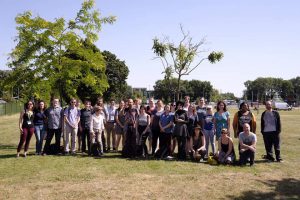August 31, 2018, by Matt Davies
DAHSS 2018 – Part 1; Researchers in a Digital Age, Coming September 14th by Odila Schroeder
Following the hugely successful Digital Arts and Humanities Summer School earlier this year, a group of students will reconvene in Bristol on September 14th 2018 for a full day of thrilling news and fascinating discussions about all things digital.
See details at the end of this blog for how you can join us – if you are quick!
What started as an innocent remark between two PhD students at the University of Nottingham, Tom Fowler and Elisa Vecchi, turned into a larger endeavor than they could have fathomed: joined by Eloise Kane from Bristol University, they managed to obtain funds from both the M3C and the South, West and Wales DTP to organize a summer school on digital arts and humanities. The Digital Arts and Humanities Summer School 2018 convened in Nottingham in the last week of June (25.-29.06.2018). Over thirty participants from the East Midlands Leicester, Bath Spa, Exeter, Southampton, Bristol, Cardiff, Reading, Nottingham Trent University and the University of Nottingham representing a broad range of disciplines in the Arts and Humanities, including Archaeology, Performance Studies, History, Philosophy, and Creative Writing and more, arrived at Cripps Hall that Monday evening.
The summer school was planned as a five-day residential event, all participants stayed in Cripps Hall, where each morning and evening the Hall and sunlit grounds were filled with chatter about the sessions, digital tools and plans for future projects. While we were each assigned to one of four groups, times between sessions allowed us to get to know the other participants.
During the following days, each group attended a series of five sessions, introducing a broad variety of skillsets and tools: Film, Audio, Digital Archives and Exhibitions, Digital Manuscripts, Databases, and Web-design. Each of us came with a very different level of experience and interest in the technologies and tools involved, but almost all of us were surprised by the accessibility of the tools we were introduced to.
These six sessions were framed by a workshop on Digital Leadership, again facilitated by Hannah Bird & Ceri Gorton. While many of us came in cynical about the corporate ideologies connected to the term “leadership”, we found ways in which we could claim it for ourselves: As scholars in the humanities, we are responsible to find ways to use the tools available to us to subvert power structures, to empower the people we care about, and to make their messages heard. Instead of becoming tech-professionals, we can stay aware of developments in the digital world by nurturing networks between technology and the humanities. Knowledge of digital tools can improve our teaching, but also change the way in which we approach and present our research.
While all of us felt motivated to shoot a blockbuster movie, digitize all our collections, develop a database, curate a digital exhibition on a beautifully designed website and start a podcast all within the next few days, chances are we will have to start small. The equipment the DHC (soon to be Arts Digital Transformations Hub) holds will allow us – indeed all of UoN’s Faculty of Arts students – to get started. And I am excited to see what we come up with for the conference “Researchers in the Digital Age” taking place on September 14th in Bristol.
Follow the DAHSS on twitter – and if you are particularly spontaneous there might still be a way for you to participate!
A full report on the Summer school in June will follow shortly here on Digital Dialogues.
No comments yet, fill out a comment to be the first


Leave a Reply